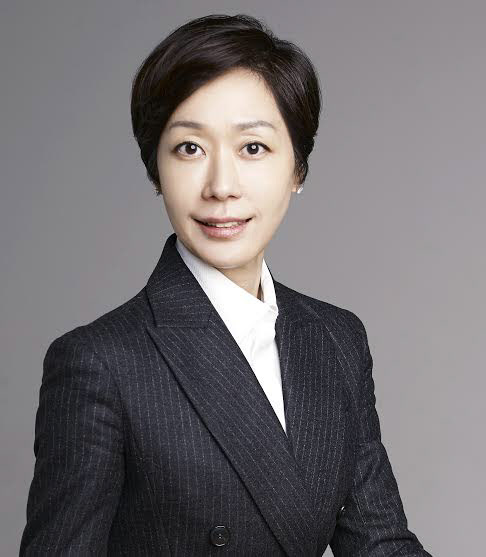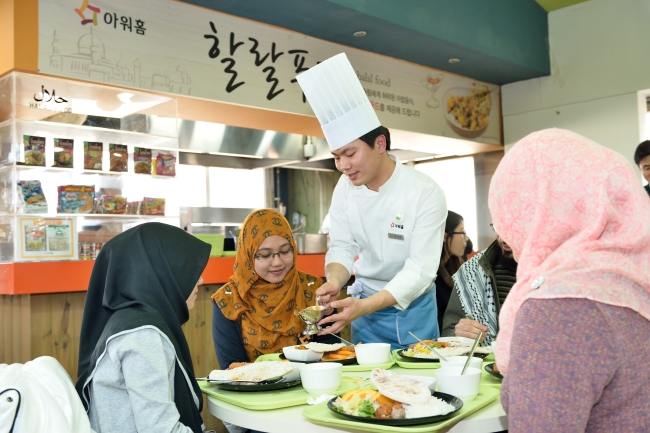ASAN, South Chungcheong Province ― On May 12, Sun Moon University canteen’s head chef Lee Gi-yeon sold all 50 servings of halal food, made specially for Muslim students, in a blink of an eye. The menu was chicken curry and naan.
“There are about 20-30 Muslims students in the university of the 10,000 students. But many Korean students who are not even Muslim enjoy eating at our halal food corner,” Lee said, explaining that for some students, this is the only meal available outside their homes.
But cooking halal food ― that are permissible for Muslims to eat or drink under Islamic rules ― is not an easy task. The dishes should not contain pork, blood, intoxicants or alcohol nor animals that have been killed without Allah’s name being pronounced before slaughter.
“There are about 20-30 Muslims students in the university of the 10,000 students. But many Korean students who are not even Muslim enjoy eating at our halal food corner,” Lee said, explaining that for some students, this is the only meal available outside their homes.
But cooking halal food ― that are permissible for Muslims to eat or drink under Islamic rules ― is not an easy task. The dishes should not contain pork, blood, intoxicants or alcohol nor animals that have been killed without Allah’s name being pronounced before slaughter.

Most of all, the food should be cooked by a Muslim. “I had to study the Islamic rules for months and befriend the Muslims to be acknowledged as a ‘non-Muslim who completely understand Islam,’” Lee said, adding that he has just added Korean cuisine, including beef barbecue and others, to the halal menu.
Lee’s venture was made possible because he works for Ourhome, a company that has been aggressively pushing halal food as its new business project for several years and sending halal ingredients to the cafeteria.
The country’s largest cafeteria-meal producer has recently gained the Korea Muslim Federation’s halal accreditation for four kinds of kimchi as well as dried seaweed products. The company established a special production line at its Jecheon plant in North Chungcheong Province to produce halal kimchi, which will debut as part of a cafeteria meal for sportsmen at the Gwangju Universiade 2015 on July 3-14.
Ourhome is also building a Halal Center in Ansan in Gyeonggi Province to develop better research and produce Muslim-tailored foods, starting with nine kinds of curry that will be supplied to not only Universiade but also its food courts at Incheon International Airport, Sun Moon University, supermarkets and others. Additionally, the company is studying the case of the world’s largest food maker, Nestle, which has 150 halal food products manufactured at 85 factories.
“We are developing sauce for popular Korean foods, such as barbecue and bibimbap, as well as chicken marinade,” Ourhome PR officer Kim Ji-soo said. The company hopes to generate 100 billion won in overseas sales by 2020.
Halal became the company’s next big thing after vice president Koo Ji-eun eyed the Muslim market and its more than 1.6 billion population several years ago.

According to a market report, the global halal food market is sized at 1.421 quadrillion won ($1.296 trillion) as of 2013 and is expected to grow to 2.720 quadrillion won by 2019. President Park Geun-hye has also recently pushed halal as the country’s next-export item and vowed state support for the industry. Instant noodle maker Nongshim has released halal-accredited products for export while Pulmuone, CJ and others have also been winning the accreditation for export items.
Ourhome said it targets 230,000 Muslims in Korea and then takes the “proved and acknowledged” halal food overseas, intending to generate 200 billion won in sales by 2020.
“I find halal food very promising because we check even the slightest part of the ingredients and they are very, very safe to eat,” said Heo Ju-nyung, manager of the Ourhome Jecheon plant.
“We have a patented technology for restricting fermentation of kimchi in order to prevent alcoholic substances from being created from it. Still keeping the taste of kimchi was challenging and something that Muslims will enjoy without having to be concerned about their religious principles,” he said.
By Bae Ji-sook (baejisook@heraldcorp.com)
-
Articles by Korea Herald




![[KH Explains] No more 'Michael' at Kakao Games](http://res.heraldm.com/phpwas/restmb_idxmake.php?idx=644&simg=/content/image/2024/04/28/20240428050183_0.jpg&u=20240428180321)













![[Herald Interview] Mistakes turn into blessings in street performance, director says](http://res.heraldm.com/phpwas/restmb_idxmake.php?idx=652&simg=/content/image/2024/04/28/20240428050150_0.jpg&u=20240428174656)
